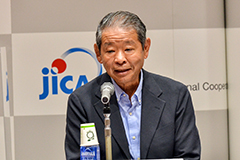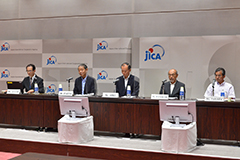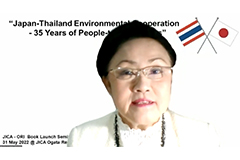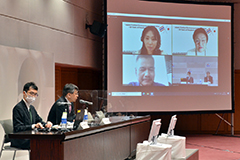Project History Book Launch: Passing the Trust Built Over 35 Years of Japan-Thailand Environmental Cooperation Onto the Next Generation
2022.08.18
On May 31, 2022, JICA Ogata Sadako Research Institute for Peace and Development (JICA Ogata Research Institute) held a seminar to commemorate the publication of “Japan-Thailand Environmental Cooperation: 35 Years of People-to-People Ties,” a Japanese book in the Project History series.
In his opening remarks, JICA Ogata Research Institute Executive Director Takahara Akio noted that as the authors of the book emphasize, trust between people determines the success or failure of a project. Takahara expressed his hope that readers will get helpful hints from the case studies in the book.
Fukuda Munehiro, one of the book’s authors, who has worked for many years on environmental issues in Thailand, began the seminar by outlining the book. Fukuda cited JICA’s continuous efforts in the environmental field in Thailand, including the establishment of the Environmental Research & Training Center (ERTC), the transfer of basic technology for environmental analysis and the development of the Pollutant Release and Transfer Register (PRTR) system. Fukuda noted that in a situation without precedent, Japanese experts worked strenuously with their Thai counterparts to foster trust and these cooperation initiatives in Thailand became a precursor to Japan’s environmental cooperation. He stated his belief that the case study in the book is universal in nature, taking into account the changes in environmental cooperation that have been made over the years as Thailand's industrial structure has become more sophisticated.

Fukuda Munehiro, one of the authors of the book “Japan-Thailand Environmental Cooperation: 35 Years of People-to-People Ties”
A panel discussion was then held, themed around the idea of sharing and passing on trust from the perspective of various stakeholders. The discussion was moderated by Adachi Ichiro, who was a JICA Ogata Research Institute research fellow at the time. The panelists, who were posted to Thailand in an expert capacity, commented about their experiences there.
Seki Soichiro, one of the book’s authors and president of the Japan Industrial Waste Information Center, said that when he was posted to Thailand in 1985, Japan’s assistance to Thailand in the field of environment had just begun. There was only Thai-language data available, so he had to start by translating the data. He also shared how he struggled to get people understand the importance of environmental issues when basic human needs were still the priority at the time. He said that more than 100 Japanese experts have been appointed to the ERTC from the public and private sectors, with many of them still involved in its work even today as their lifework. He said their involvement has been the driving force to continuously deepen and enrich the environmental cooperation over the last 35 years.

The panelists, who were posted to Thailand in an expert capacity, shared their experiences
Kadokami Kiwao, guest researcher and emeritus professor at the University of Kitakyushu, Institute of Environmental Science and Technology, was posted to the ERTC in 1993 as a short-term expert. He was in charge of chemical analyses of leachate from waste disposal sites and environmental surveys in the vicinity of treatment plants. Kadokami shared an episode that indicates how time-consuming it was to conduct a simple analysis in Thailand, which would have been completed smoothly in much less time in Japan. He recalled how he interacted with local staff by discussing with them, “Just like a tortoise, we should go steadily, step by step, because you need loving care to get good results in your analyses.” Since 2007, he has continued to maintain a relationship with the ERTC through activities such as inviting its researchers to the annual meeting of the Japan Society for Environmental Chemistry, of which he is a member. He reported that as a result, a cooperative framework has emerged between academic associations for environmental studies in Japan and Thailand.
Tanaka Hideho is on the environmental team at the Osaka Prefectural Corporation for Agricultural Land and Development and Greenery-Environment Promotion, and serves as sub-manager at the Center for the Promotion of Efforts to Prevent Global Warming. He was posted to Thailand in 1995 for two years as a long-term expert. He was then transferred to the Ministry of the Environment for two years, starting in 2003, and was the point of contact for JICA. He stressed the importance of human resource development for project success, saying that while there were times that projects did not go smoothly, Fukuda managed to build a local team with good personal relationships that can solve problems. Watanabe Seiji, one of the authors, who was posted to the ERTC for roughly four years starting in 1990 as a long-term expert, also gave his comment on technology transfers regarding environmental surveys of hazardous chemical substances. He explained that the number of hazardous chemical substances to be investigated and the technologies involved were diverse, so he chose the method of human resource development in which technologies are transferred intensively to those in charge of analysis and then shared within the organization.
Fukuda wrapped up the panel by saying that we may have a preconception that technical cooperation is about Japan unilaterally providing technology to developing countries, but the project members from Japan were also greatly inspired by the Thai members. Their people-to-people ties grew stronger, and they were able to work hard, even on matters beyond their terms of reference, precisely because of their shared passion. He noted that in recent years, the form of international cooperation has gradually changed, and he would like to see how the younger generation will create new forms of technical cooperation in the future.
The panel discussion was followed by a round-table titled “Building Trust in Japan-Thailand Environmental Cooperation: Young Experts’ Perspective,” moderated by Otsuka Takahiro, deputy director at the JICA Global Environment Department.
First, the first director of ERTC, Monthip Sriratana Tabucanon, also known as “the mother of Japan-Thailand environmental cooperation,” took the stage. As environmental problems in Thailand were becoming more serious, she came to Japan as a JICA trainee. Her first-hand experience with Japan’s advanced initiatives led to the start of environmental cooperation between Japan and Thailand. She noted that good relationships built by Japanese experts and Thai counterparts have made both governments realize the benefits of Japan’s cooperation and the value of working together. Even after the project had ended, these activities were passed down over the course of many years. She stated her desire to convey the importance of trust to the younger generation. Looking back, Decha Pimpisut, who was involved in the PRTR project, said that the staff members in Thailand, who were working in the Department of Industrial Work at the Ministry of Industry and the Pollution Control Department at the Ministry of Natural Resources and Environment, were still young and needed some experience to learn techniques for proper management, not one-sided management based on a command-and-control approach. However, because Fukuda was able to patiently forge good relationships with them, both at work and after work, they together were able to sort out some difficulties they had. He pointed out that excellent teamwork was the key to the success of the project.

Monthip Sriratana Tabucanon is known as "the mother of Japan-Thailand environmental cooperation"
From the Japan side, Takahashi Makoto of EX Research Institute Ltd., who joined a project to set environmental and emission standards for volatile organic compounds in Thailand starting in 2005, shared his experiences. He said that many of his Thai counterparts had earned doctorate degrees and had an abundance of practical experience and knowledge, so he was able to learn a great deal from them, not just in terms of technology, but with regard to their working style and research approach as well. Hishida Nozomi of Nippon Koei Co., Ltd., looked back on her experiences from her four-year posting in Thailand, pointing out that the relationship between the two countries has changed. She commented that while Japan was a pioneer in addressing environmental problems in the past, and had a teacher-student relationship with Thailand, the two countries are now facing common challenges, and are becoming equal partners that solve them together.

Partcicipants from Japan and Thailand exchanged views at the round table
Finally, the Japanese side asked questions to the Thai side, and lively exchanges of opinions took place. In response to Hishida’s question about how to attain cooperation from people and organizations in other fields as environmental problems grow ever more complex and interdisciplinary, Monthip replied that ERTC has been building a network of research institutions and holding events through their personal connections to forge deeper relationships in order to get many organizations involved. In response to Takahashi’s question about what is important in sharing Thailand’s experiences with other ASEAN countries, Decha replied that because each country has its own situation, with differing levels of development and different environmental problems, it is vital to make careful progress with projects while adapting them to the conditions in each country.
Project History Launch “Japan-Thailand Environmental Cooperation -35 Years of People-to-People Ties”

事業事前評価表(地球規模課題対応国際科学技術協力(SATREPS)).国際協力機構 地球環境部 . 防災第一チーム. 1.案件名.国 名: フィリピン共和国.

事業事前評価表(地球規模課題対応国際科学技術協力(SATREPS)).国際協力機構 地球環境部 . 防災第一チーム. 1.案件名.国 名: フィリピン共和国.

事業事前評価表(地球規模課題対応国際科学技術協力(SATREPS)).国際協力機構 地球環境部 . 防災第一チーム. 1.案件名.国 名: フィリピン共和国.

事業事前評価表(地球規模課題対応国際科学技術協力(SATREPS)).国際協力機構 地球環境部 . 防災第一チーム. 1.案件名.国 名: フィリピン共和国.

事業事前評価表(地球規模課題対応国際科学技術協力(SATREPS)).国際協力機構 地球環境部 . 防災第一チーム. 1.案件名.国 名: フィリピン共和国.
scroll